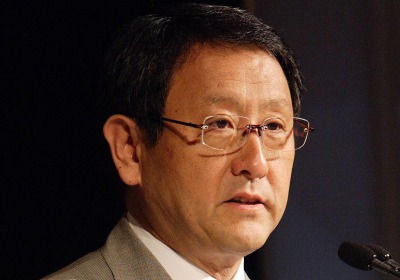Toyota outlines quality reforms; chief bows out of U.S. hearings
Wed, 17 Feb 2010
Conceding that breakneck expansion led to Toyota Motor Corp.'s current recall crisis, president Akio Toyoda outlined reforms meant to get quality back on track, including more active use of the car's so-called black box crash data recorder.
Toyoda, grandson of the carmaker's founder, also indicated he won't sit before Congressional hearings into the quality lapses that have triggered recalls of more than 8.5 million vehicles since last fall.
Yoshimi Inaba, the head of Toyota's U.S. operations, is best suited to testify before the lawmakers because he is most familiar with the local U.S. market, Toyoda said.
“Mr. Inaba and our executives in North America have my highest level of trust, and I am sure they are well equipped to respond,” Toyoda, 53, said a news conference today. “I will focus on internal reform to improve quality and support Inaba from our headquarters.”
Toyoda said that he still plans to visit the United States to rally workers, dealers and suppliers. The details and timing of the trip are still being worked out, he said.
Toyoda is under pressure to visit the United States, historically Toyota's most profitable market, in the wake of a recall emergency that began last fall in the United States and has snowballed to a global level. Among the recalls were two massive actions to address unintended acceleration in Toyota and Lexus cars and another to fix an antilock braking glitch in the Prius.
Inaba is to testify Feb. 24 before the House Oversight Committee. The hearing comes amid a fresh investigation by the National Highway Traffic Safety Administration into whether Toyota acted too slowly in announcing its recalls or failed to include enough vehicles.
A congressional Republican spokesman said today the House Oversight Committee will ask "all the right questions" of Toyota.
"I would think given the tremendous scrutiny Mr. Toyoda and his company are under, he would have seized the opportunity to personally appear and use the hearing as a forum to move forward," Kurt Bardella, spokesman for U.S. Rep. Darrell Issa, R-Calif., the ranking member of the House Oversight Committee, said in an e-mail.
"Obviously, Mr. Toyoda is not as eager to give Congress and the American people answers as we first thought. It's telling that the only way he'll come before the Oversight Committee is by formal invitation."
Reform rollout
In Tokyo, Toyoda outlined several new measures meant to improve quality. The automaker will:
--Appoint a chief quality officer for each geographic region;
--Expand the network of local technical offices to conduct on-site troubleshooting;
--Install brake-override systems on all future models worldwide;
--Make better use of the onboard data event recorders to analyze accidents.
The overhaul builds on more general improvements outlined by Toyoda earlier this month. Toyoda said then he would chair a newly created a Special Committee for Global Quality.
The regional chief quality officers will sit on that committee and be responsible for rounding up customer feedback so the company can react more quickly when problems arise.
The global committee will hold its first meeting March 30.
Toyota will also equip all models worldwide with a brake-override system that will cut power to the engine if there is a conflicting signal between the gas pedal and brake. It had already announced that all new cars in North America would be getting the technology.
Finally, Toyota said it will more actively use the data collected in vehicle event data recorders. These devices are similar to the black boxes on aircraft and record information, such as vehicle and engine speed, in the seconds immediately before a crash.
“By reading the data, we will be able to identify causes more quickly,” Shinichi Sasaki, executive vice president in charge of quality, said at the press conference.
“I think this will result in substantial improvement in our analytical capability.”
Too big, too fast
President Toyoda said setting up new technical offices, beginning with the United States, will enable field engineers to assess customer complaints quickly and nip problems in the bud. The goal is to be able to conduct on-site inspections within 24 hours of any reported malfunction.
Also on tap: “Customer First” training centers to inculcate local workers in “The Toyota Way.''
Toyoda said human resource training hasn't kept pace with the carmaker's explosive growth over the past decade. In fact, the world's largest automaker lost sight of matching production to actual demand, a keystone tenet of the company's business strategy, he said.
“With the rapid expansion of production, perhaps we weren't able to develop appropriate engineering skills and human resources,” Toyoda said. “The basic rule of the Toyota Production System is build only as many cars as can match demand, and we ourselves broke that rule.”
By Hans Greimel- Automotive News

